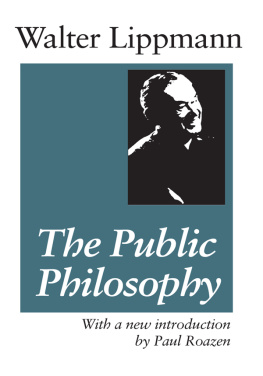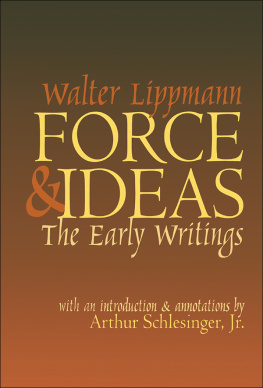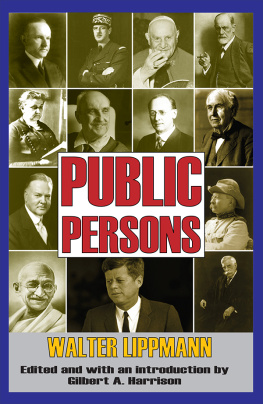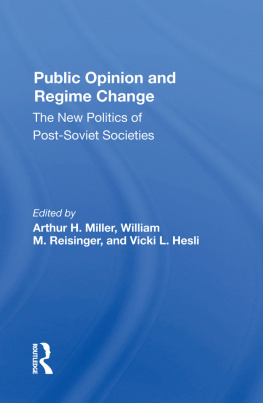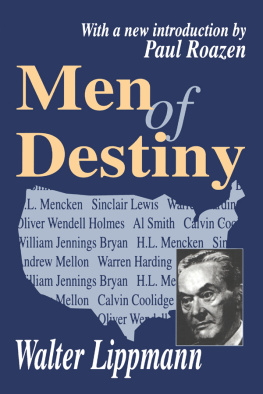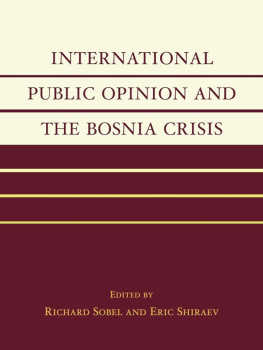Table of Contents
To Faye Lippmann
Wading River, Long Island. 1921.
"Behold! human beings living in a sort of underground den, which has a mouth open towards the light and reaching all across the den; they have been here from their childhood, and have their legs and necks chained so that they cannot move, and can only see before them; for the chains are arranged in such a manner as to prevent them from turning round their heads. At a distance above and behind them the light of a fire is blazing, and between the fire and the prisoners there is a raised way; and you will see, if you look, a low wall built along the way, like the screen which marionette players have before them, over which they show the puppets.
I see, he said.
And do you see, I said, men passing along the wall carrying vessels, which appear over the wall; also figures of men and animals, made of wood and stone and various materials; and some of the prisoners, as you would expect, are talking, and some of them are silent?
This is a strange image, he said, and they are strange prisoners.
Like ourselves, I replied; and they see only their own shadows, or the shadows of one another, which the fire throws on the opposite wall of the cave?
True, he said: how could they see anything but the shadows if they were never allowed to move their heads?
And of the objects which are being carried in like manner they would see only the shadows?
Yes, he said.
And if they were able to talk with one another, would they not suppose that they were naming what was actually before them?"
The Republic of Plato, Book Seven.
(Jowett Translation.)
Chapter I.
The World Outside and the Pictures in Our Heads
1
There is an island in the ocean where in 1914 a few Englishmen, Frenchmen, and Germans lived. No cable reaches that island, and the British mail steamer comes but once in sixty days. In September it had not yet come, and the islanders were still talking about the latest newspaper which told about the approaching trial of Madame Caillaux for the shooting of Gaston Calmette. It was, therefore, with more than usual eagerness that the whole colony assembled at the quay on a day in mid-September to hear from the captain what the verdict had been. They learned that for over six weeks now those of them who were English and those of them who were French had been fighting in behalf of the sanctity of treaties against those of them who were Germans. For six strange weeks they had acted as if they were friends, when in fact they were enemies.
But their plight was not so different from that of most of the population of Europe. They had been mistaken for six weeks, on the continent the interval may have been only six days or six hours. There was an interval. There was a moment when the picture of Europe on which men were conducting their business as usual, did not in any way correspond to the Europe which was about to make a jumble of their lives. There was a time for each man when he was still adjusted to an environment that no longer existed. All over the world as late as July 25th men were making goods that they would not be able to ship, buying goods they would not be able to import, careers were being planned, enterprises contemplated, hopes and expectations entertained, all in the belief that the world as known was the world as it was. Men were writing books describing that world. They trusted the picture in their heads. And then over four years later, on a Thursday morning, came the news of an armistice, and people gave vent to their unutterable relief that the slaughter was over. Yet in the five days before the real armistice came, though the end of the war had been celebrated, several thousand young men died on the battlefields.
Looking back we can see how indirectly we know the environment in which nevertheless we live. We can see that the news of it comes to us now fast, now slowly; but that whatever we believe to be a true picture, we treat as if it were the environment itself. It is harder to remember that about the beliefs upon which we are now acting, but in respect to other peoples and other ages we flatter ourselves that it is easy to see when they were in deadly earnest about ludicrous pictures of the world. We insist, because of our superior hindsight, that the world as they needed to know it, and the world as they did know it, were often two quite contradictory things. We can see, too, that while they governed and fought, traded and reformed in the world as they imagined it to be, they produced results, or failed to produce any, in the world as it was. They started for the Indies and found America. They diagnosed evil and hanged old women. They thought they could grow rich by always selling and never buying. A caliph, obeying what he conceived to be the Will of Allah, burned the library at Alexandria.
Writing about the year 389, St. Ambrose stated the case for the prisoner in Plato's cave who resolutely declines to turn his head. "To discuss the nature and position of the earth does not help us in our hope of the life to come. It is enough to know what Scripture states. 'That He hung up the earth upon nothing' (Job xxvi. 7). Why then argue whether He hung it up in air or upon the water, and raise a controversy as to how the thin air could sustain the earth; or why, if upon the waters, the earth does not go crashing down to the bottom? Not because the earth is in the middle, as if suspended on even balance, but because the majesty of God constrains it by the law of His will, does it endure stable upon the unstable and the void."
It does not help us in our hope of the life to come. It is enough to know what Scripture states. Why then argue? But a century and a half after St. Ambrose, opinion was still troubled, on this occasion by the problem of the antipodes. A monk named Cosmas, famous for his scientific attainments, was therefore deputed to write a Christian Topography, or "Christian Opinion concerning the World."
Far less should he go to the Antipodes; nor should any Christian prince give him a ship to try; nor would any pious mariner wish to try. For Cosmas there was nothing in the least absurd about his map. Only by remembering his absolute conviction that this was the map of the universe can we begin to understand how he would have dreaded Magellan or Peary or the aviator who risked a collision with the angels and the vault of heaven by flying seven miles up in the air. In the same way we can best understand the furies of war and politics by remembering that almost the whole of each party believes absolutely in its picture of the opposition, that it takes as fact, not what is, but what it supposes to be the fact. And that therefore, like Hamlet, it will stab Polonius behind the rustling curtain, thinking him the king, and perhaps like Hamlet add:
"Thou wretched, rash, intruding fool, farewell!
I took thee for thy better; take thy fortune."
2
Great men, even during their lifetime, are usually known to the public only through a fictitious personality. Hence the modicum of truth in the old saying that no man is a hero to his valet. There is only a modicum of truth, for the valet, and the private secretary, are often immersed in the fiction themselves. Royal personages are, of course, constructed personalities. Whether they themselves believe in their public character, or whether they merely permit the chamberlain to stage-manage it, there are at least two distinct selves, the public and regal self, the private and human. The biographies of great people fall more or less readily into the histories of these two selves. The official biographer reproduces the public life, the revealing memoir the other. The Charnwood Lincoln, for example, is a noble portrait, not of an actual human being, but of an epic figure, replete with significance, who moves on much the same level of reality as Aeneas or St. George. Oliver's Hamilton is a majestic abstraction, the sculpture of an idea, "an essay" as Mr. Oliver himself calls it, "on American union." It is a formal monument to the state-craft of federalism, hardly the biography of a person. Sometimes people create their own facade when they think they are revealing the interior scene. The Repington diaries and Margot Asquith's are a species of self-portraiture in which the intimate detail is most revealing as an index of how the authors like to think about themselves.




